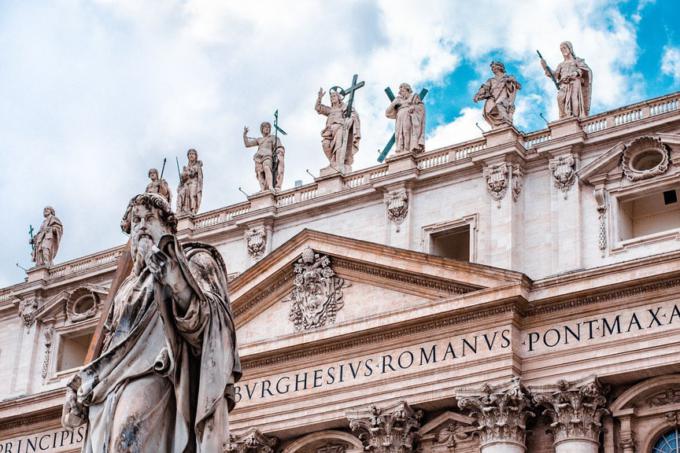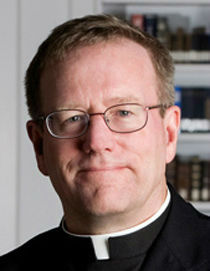
Spirituality
The invitation of Christ goes out to everyone. Period. Black, white, male, female, gay, straight, transgender, fascist, communist -- whoever you are -- you are welcome.

Barron
I would like to follow up on an earlier article I wrote on the notions of "inclusivity" and "welcome," which have come to dominate the Catholic conversation in the lead-up to the Synod on Synodality. Many voices from around the world are clamoring for greater inclusion in the Church and are scoring Church leaders for maintaining, apparently, structures of exclusion. A first difficulty with this, I have argued, is that it runs afoul of the example of Jesus himself, who was, quite obviously, radical in his welcoming outreach to everyone, but at the same time, equally radical in his demand for conversion. To no one did Jesus ever offer welcome tout court; he always summoned them to the hard work of real discipleship.
A second problem I would like to explore in this article is the logical inconsistency involved in treating inclusivity as an absolute value. The paradox is that real inclusion positively depends upon real exclusion, and the slightest reflection can make this clear. When someone petitions welcome or inclusion into a group or a society of any kind, she is seeking entry into a collectivity with some sort of definition. Otherwise, the inclusion would lose any significance. But to speak of definition is to speak of limits, borders, distinctiveness, and a peculiar structuring logic.
Thus the Abraham Lincoln Society is made up of those who have an affection for and/or deep interest in the life and accomplishments of Abraham Lincoln. By its very nature, it would exclude anyone uninterested in Lincoln or desirous of undermining the study of the 16th president. Thus, if a person with a profound passion for Lincoln presented herself for membership but was told that she would be excluded on account of her gender, we would quite rightly take the Lincoln Society for task for being unjustly exclusive. But if someone with no interest in Lincoln whatsoever were politely informed that he would not be accepted into the group and then were to complain of the injustice being done to him, we would have little sympathy with him. The first applicant was seeking to conform herself to the inner logic of the society, but the second applicant was not.
Or to take another example, the Chicago Symphony Orchestra is a highly exclusive society, for it is made up of some of the very best instrumentalists on the planet. Those who play for the CSO have made it through a series of fiercely competitive contests ever since they were small children. Armies of players have been excluded all along the way in order for them to occupy the chairs they have in the orchestra, and this very exclusivity is what makes the Chicago Symphony what it is. Now suppose that an extremely gifted young African-American flautist sought inclusion in the CSO. Suppose further that he had performed magnificently at his audition and had glowing recommendations from other elite players. And then suppose that he was excluded on account of his race. The entire country would, with complete justification, rise up in protest at the gross injustice of the situation. The reason for the outcry would be, of course, that the young man was legitimately seeking inclusion according to the defining logic of the orchestra, and his race should never have been a consideration. But now suppose that someone who could barely play a simple tune on the flute was applying for admission to the CSO. He would, naturally, be rejected. And then suppose that, in the wake of his rejection, he were loudly to complain that the Chicago Symphony is an elitist organization marked by structures of exclusivity. Well, the whole country, I imagine, would laugh or yawn, for he would be treating this world-class ensemble as though it had no defining qualities or no legitimate expectations of those who would participate in it.
Now, to be sure, both of these analogies limp, but something at least similar obtains in regard to welcoming someone into the life of the Church. The invitation of Christ goes out to everyone. Period. Black, white, male, female, gay, straight, transgender, fascist, communist -- whoever you are -- you are welcome. The arms of the Church, like the arms of the Bernini colonnade outside St. Peter's Basilica, reach out to include you. But you are being invited, not into an amorphous collectivity, but rather into a defined community, into a family with a moral and legal structure, into the mystical body of Christ. If, therefore, you were to say, "I demand to be included, but I have no interest in conforming myself to Christ's demands, to the teaching of the Church, to the expectations of the community," you would find yourself in an untenable position.
It is precisely the dynamic tension between inclusion and exclusion that, I fear, is often overlooked in the sometimes overly enthusiastic language of "welcome." I would like to conclude by repeating a line from Francis Cardinal George that cannot really be improved upon as a summary of what I have been arguing here: "All are welcome in the Church, but on Christ's terms, not their own."
- Bishop Robert Barron is the founder of the global ministry, Word on Fire, and is Bishop of the Diocese of Winona-Rochester.
Recent articles in the Spirituality section
-
No line-drawingMichael Pakaluk
-
Physician-assisted suicide is a slippery slopeCardinal Seán P. O’Malley
-
He saw the cloths and believedBishop Robert Barron
-
God's instrument for viewing the crucifixionMichael Pakaluk
-
QuinquagesimaMichael Pakaluk





